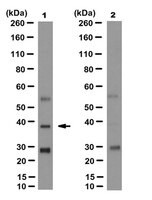Expression of the phospholipid scramblase (PLSCR) gene family during the acute phase response.
Lu, B; Sims, PJ; Wiedmer, T; Moser, AH; Shigenaga, JK; Grunfeld, C; Feingold, KR
Biochimica et biophysica acta
1771
1177-85
2007
Kivonat megmutatása
Phospholipid scramblase 1 (PLSCR1) is a member of PLSCR gene family that has been implicated in multiple cellular processes including movement of phospholipids, gene regulation, immuno-activation, and cell proliferation/apoptosis. In the present study, we identified PLSCR1 as a positive intracellular acute phase protein that is upregulated by LPS in liver, heart, and adipose tissue, but not skeletal muscle. LPS administration resulted in a marked increase in PLSCR1 mRNA and protein levels in the liver. This stimulation occurred rapidly (within 2 h), and was very sensitive to LPS (half-maximal response at 0.1 microg/mouse). Moreover, two other APR-inducers, zymosan and turpentine, also produced significant increases in PLSCR1 mRNA and protein levels, indicating that PLSCR1 was stimulated in a number of models of the APR. To determine signaling pathways by which LPS stimulated PLSCR1, we examined the effect of proinflammatory cytokines in vitro and in vivo. TNFalpha, IL-1beta, and IL-6 all stimulated PLSCR1 in cultured Hep B3 hepatocytes, whereas only TNFalpha stimulated PLSCR1 in cultured 3T3-L1 adipocytes, suggesting cell type-specific effects of cytokines. Furthermore, the LPS-stimulated increase in liver PLSCR1 mRNA was greatly attenuated by 80% in TNFalpha and IL-1beta receptor null mice as compared to wild-type controls. In contrast, PLSCR1 levels in adipose tissue were induced to a similar extent in TNFalpha and IL-1beta receptor null mice and controls. These results indicate that maximal stimulation of PLSCR1 by LPS in liver required TNFalpha and/or IL-1beta, whereas the stimulation of PLSCR1 in adipose tissue is not dependent on TNFalpha and/or IL-1beta. These data provide evidence that PLSCR1 is a positive intracellular acute phase protein with a tissue-specific mechanism for up-regulation. | 17590392
 |















